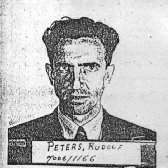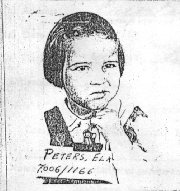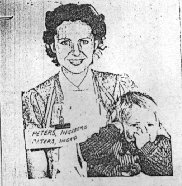The Case of Rudolf Peters’ and Family
©FOITIMES.COM
2002
On February 6, 1943, Rudolf
Peters and his wife, Ingeborg, and his two daughters, Ingrid, age 1 and
Elke, age 4, arrived in the United States aboard the U.S. Army Transport
Puebla. The ship’s manifest
shows that Peters and his family departed from Puenta Arenas [Puntarenas],
Costa Rica and landed at San Pedro, California. Prior to their arrest they
resided in San Jose, Costa Rica. Based upon other personal counts
it is believed that the Peters' were forced onto the ship against their
will; during the voyage they were under armed guard and hardly saw the
light of day; and upon arrival at their port of debarkation they were sprayed
with DDT.
The Immigration and Naturalization Service (INS) report of the Peters'
family reveals the following: Rudolf Peters: Occupation: farmer
and the owner of sugar and coffee plantations in Costa Rica; he was born
of German parents in San Jose, Costa Rica on October 16, 1909. Ingeborg
Peters: Occupation :housewife; she was born in Hamburg, Germany, on September
8, 1918. Both children, Elke and Ingrid, were born in Costa Rica.
The Peters’ were among the 4,000 to 5,000 German Latin
Americans who were arrested for exchange barter with the Third Reich.
The U.S. State Department in collusion with the Latin American governments
arranged these arrests and subsequent transport to and internment in the
United States . Once in the United States they were declared illegal immigrants.
The day after their arrival in San Pedro, California, a Board
of Special Inquiry
of the Immigration and Naturalization Service (INS) at San Pedro met for
the purpose of determining the right of the Peters’ to enter the United
States. The authority for the Board to conduct this inquiry was a warrant
issued by the U.S. Attorney General, Francis Biddle, dated February 6,
1943, that was addressed to the Commissioner of the Immigration and Naturalization
Service. In part, this warrant reads:
“The said, Rudolf Peters
is to be detained and confined until further order under the authority
of the agreement between the United States and the Republic of Costa Rica.”
This Board determined that the Peters’ were not
in possession of a valid passport or visa; and that they were immigrants
who were not in possession of a valid immigration visa required by the
Immigration Act of 1924. Thus they were to be excluded, i.e., not allowed
entry into the United States. At 3:50 P.M. on the same day (February 7,
1943) it was ordered that the Peters’ were to be detained at Crystal City,
Texas. The Crystal City, Texas internment camp was the largest internment
camp for families, one of over 50 detention facilities in the United States.
On February 11, 1944, the Peters’ were deported to Germany. As were thousands
of other German Americans and German Latin Americans the Peters’ family
was exchanged with the Third Reich for American businessmen and tourists
caught behind enemy lines. Their voyage and exchange was one of six
that took place during 1944 and 1945.



See The Eiserloh
Story and/or The
Graber Story to learn of the ordeal that the Peters’ may have experienced
upon arrival in a Germany that was under siege. To be continued.....
The source material for this report comes from National Archives file:Records
Group 85, INS, Crystal City, Texas, Files, Case # 935/083, Rudolph Peters
(Ingeborg, Elke, Ingrid).Box 66, 17W3/7/8/6.Signed by:Pam Sleverson 08-06-02.
State Department Memorandums dated November 15, 23, and 24, 1943, provide
strong evidence that the United States interfered in the internal affairs
of other republics; and that the impetus for the arrests and taking of
enemy nationals for internment in the United States had been approved by
the Enemy Alien Control Unit of the Department of Justice.See pages 1671
through 1674 of Volume IV, The World War II Experience-the Internment of
German Americans of German Americans in the World Wars, K.G. Saur: New
Providence, 1995.
BSI # 24 (1943) Members: Inspectors H.E. Day, Chairman and J.F. Meier,
Member, and Clerk Josephine Knoy, Member-Secretary; German and Spanish
Interpreter Member Meier (Acting).


